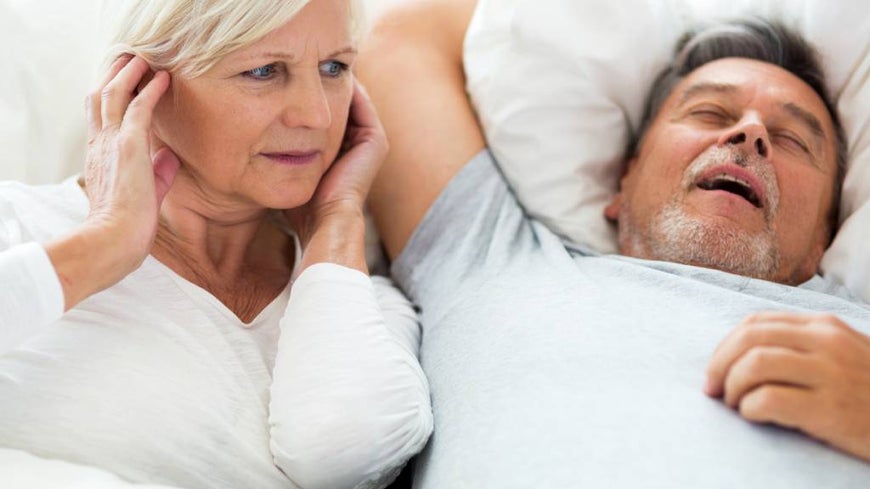Don’t let snoring ruin a good night’s sleep

Written by Sandra Bridekirk for Australian Seniors.
Do you wake up tired, no matter how early you hit the hay? Or are you jolted awake by your partner’s elbow and a complaint that you’re “snoring again”? It’s a pretty typical scenario, and one that affects slightly more men than women – about 40% of men and 30% of women have at least mild snoring.
Alcohol can be a culprit, as it relaxes the muscles in your throat, making them more prone to vibration (the natural process that occurs during sleep). Being overweight is also a major contributor.
What factors contribute to snoring?
Other physical factors include sleeping on your back, which makes your tongue fall back, impeding airflow; breathing through your mouth, which adds to vibration; and of course, allergies, smoking or having a cold – all of which can obstruct airflow.
“Simple snoring can be improved by using a body repositioning device, such as the NightShift Active Sleep Repositioner, to stop you sleeping on your back,” says Associate Professor Darren Mansfield, a sleep disorders and respiratory physician, and deputy chair of the Sleep Health Foundation. NightShift, worn around the neck, has a sensor that detects when you are sleeping on your back and vibrates to encourage you to turn to the side.
You can also try cheaper options, such as nasal stents like the Mute, to dilate the nasal chamber, or nasal strips like Breathe Right, from your chemist. “For people with clear anatomical issues with their nose, surgery can also be an option,” he says.
Is snoring dangerous for your health?
More than 10% of regular snorers have obstructive sleep apnoea (OSA), when the throat becomes partially or completely blocked during sleep, leading to pauses in breathing. OSA is linked to a greater risk of high blood pressure, heart attack and stroke. It’s diagnosed via a sleep study that monitors breathing and oxygen levels.
The gold standard in treatment is a CPAP (continuous positive airway pressure) machine, which delivers room air, under pressure, to the upper airway as you sleep, via a mask and tube. But other measures can help, too. “The simplest options are always the best, such as weight loss and alcohol reduction,” he says.
5 snoring and sleep tips from Associate Professor Darren Mansfield
1. How can I tell if my snoring is serious?
You’ll know if your partner is reporting concerns about your breathing patterns – that you’re stopping breathing or having abrupt gasps. Also, if your sleep is not restorative and you are drowsy during the day.
2. Can damage from obstructive sleep apnoea (OSA) be reversed?
Treatment can significantly reduce your future risk of cardiovascular events such as high blood pressure and stroke. OSA has been linked to cognitive decline and dementia, although it’s not been well established. But there can be improvements.
3. What are the best treatment options?
CPAP machines work with the greatest efficacy and we can practically guarantee that snoring will cease. You can also trial a device before committing to one. Jaw advancement splints [mouth splints worn at night] can be effective in mild to moderate cases. You can try a cheaper one before investing, but high-quality ones are a lot more comfortable.
4. What if I can’t tolerate a CPAP machine?
About 40% of patients will struggle with it, but we always clarify if there is a technical element before we give up – fitting a mask is like fitting a pair of shoes. After that, we work back through alternatives.
5. And your top sleep tip?
Stick to regular bed and wake-up times and if you nap in the day, keep it under 20 minutes.
For more information, go to sleephealthfoundation.org.au
27 Sept 2021